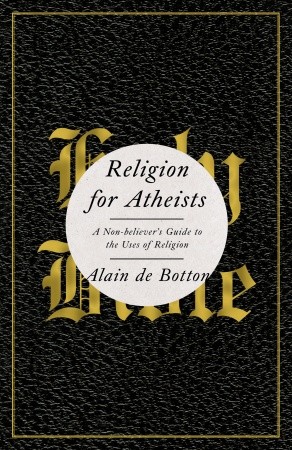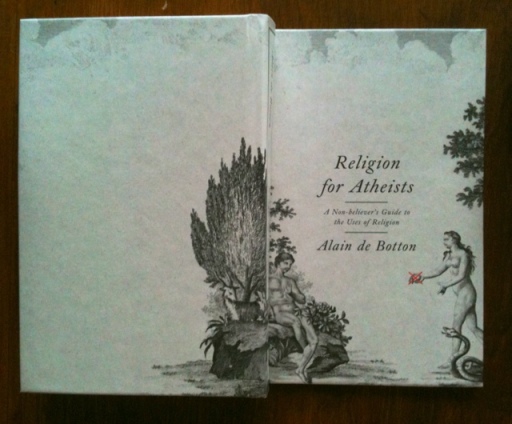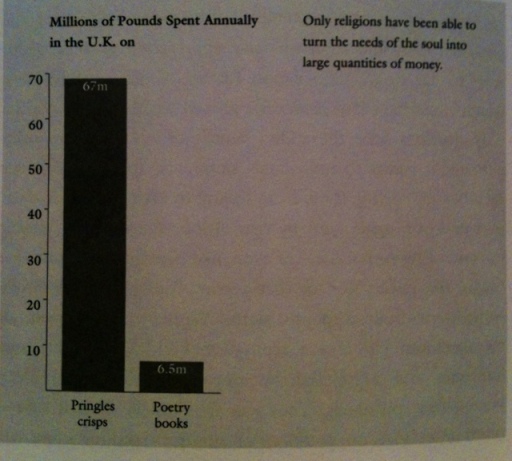
I’m slightly familiar with Alain de Botton’s work, and I’ve taken something of an interest in the so-called “New Atheist” movement — Hitchens, Dawkins, et al — so when a review copy of Religion for Atheists showed up a few weeks ago, it piqued my interest. I found its cover playfully annoying—a hole in the holy book—and its subtitle—A Non-believer’s Guide to the Uses of Religion—downright obnoxious. Still, I gotta give props to the design team at Pantheon for the book that’s under the horrid jacket:

Unfortunately, an attractive hardback design sans jacket is the best this book has to offer.
By way of explication (and my own laziness and indifference on this volume) here’s some copy on the book from de Botton’s website:
What if religions are neither all true or all nonsense? The boring debate between fundamentalist believers and non-believers is finally moved on by Alain’s inspiring new book, which boldly argues that the supernatural claims of religion are of course entirely false – and yet that religions still have some very important things to teach the secular world.
Religion for Atheists suggests that rather than mocking religions, agnostics and atheists should instead steal from them – because they’re packed with good ideas on how we might live and arrange our societies. Blending deep respect with total impiety, Alain (a non-believer himself) proposes that we should look to religions for insights into, among other concerns, how to:
– build a sense of community
– make our relationships last
– overcome feelings of envy and inadequacy
– escape the twenty-four hour media
– go travelling
– get more out of art, architecture and music
– and create new businesses designed to address our emotional needs.
For too long non-believers have faced a stark choice between either swallowing lots of peculiar doctrines or doing away with a range of consoling and beautiful rituals and ideas. At last, in Religion for Atheists, Alain has fashioned a far more interesting and truly helpful alternative.
The tone of the copy gives one a sense of the utter glibness of de Botton’s pamphlet. The book smacks of crude self-helpery, a hodgepodge of faux-intellectual poses for those who can smugly dismiss the history of philosophy. It’s like The Purpose Driven Life for atheists. There is a picture or graphic on every other page; de Botton seems to include these in lieu of, say, providing verbal imagery, or meaningful context, or simply trusting the intellect of his audience.
I suppose that I am fundamentally at odds with de Botton. I agree that religion has done much to initiate and facilitate (and in fairness, perhaps at times mitigate) atrocity; I agree that many (if not most) of the Big Problems in the world stem from the herd-mentality that organized religions impose on the people they indoctrinate. But de Botton would like to replace one herd with another.
Here is the Swiss writer suggesting that the academy (which he too-readily identifies as a bastion of atheist mores) follow the practices of black Southern Baptist churches:
The contrast with the typical lecture in the humanities could hardly be more damning. And unnecessary. What purpose can possibly be served by the academy’s primness? How much more expansive the scope of meaning in Montaigne’s essays would seem if a 100-strong and transported chorus were to voice its approval after every sentence. How much longer might Rousseau’s philosophical truths linger in our consciousness if they were structured around rhythmical verses of call-and-response. Secular education will never succeed in reaching its potential until humanities lecturers are sent to be trained by African-American Pentecostal preachers.
What we see here is a romanticization and idealization of a particular part of a culture that I think de Botton in no way understands. What’s even more disturbing here is his elevation of groupthink and indoctrination practices (I hear, “Oh no, I don’t want to play with Delta children” humming in the background). We see here the same teleological thinking that marks much of religious dogma, the sense that truth has been attained; the search is over—we just need to repeat it rhythmically enough, soak our young in it, until they think just like we do. This position strikes me as potentially dangerous as any organized religion’s attempts at indoctrination.
Religion for Atheists is full of sloppy logic gussied up in rushed anecdotes and glossed over with barely-connected pictures and silly graphs. Look at the following example, a visual non sequitur masquerading as meaningful information:

Are we supposed to be horrified that the British spend more on potato chips than poetry books? Apples and oranges, bro. But what’s really ridiculous is the stinky pious claim that “Only religions have been able to turn the needs of the soul into large quantities of money.” This claim is plain silly, or at least predicated on a too-singular definition for “needs of the soul.”
Religion for Atheists seems to miss the point that many (if not most) atheists and agnostics are at heart free thinkers. De Botton romanticizes the mystery, awe, and grace of religion, even as he suggests that there is no metaphysical center from which these attributes emanate. His most basic argument really boils down to something like, “Hey, there is no God, no spirit, but religion does a good job of consoling people and keeping them in moral order, so, instead of TV and junk food, we should use the aesthetics of religion as consolation.” There is nothing revolutionary about this idea.
Religion for Atheists is a smug little tract, the sort of book that a supermarket would sell along with Chicken Soup for the Soul if supermarkets had the guts to sell self-help books for atheists. Readers should not be duped into thinking that de Botton has taken any real stance or said anything new here. Instead, hiding behind the pasteboard mask of utility, he offers a crass dodge away from meaningful inquiry. Get thee to Nietzsche instead.

Oh, he’s Swiss? Well, that explains it. Mindset, mindset, mindset.
LikeLike
I was tempted to read this just to see what he had to say, but I’m inclined to skip it altogether. I feel no pressing need to have my intelligence insulted.
LikeLike
I have the book on order. I really liked Alain’s earlier book about Proust. So I am not deterred by this review. His Ted Talk on his new book is worth a listen. Thttp://blog.ted.com/2012/01/17/atheism-2-0-alain-de-botton-on-ted-com/
There are many people who “Enjoy Christmas Carols,but don’t believe in angels”
LikeLike
“Get thee to Nietzsche”, God how true! I’ve been worn tired by the new lazy Atheist movement. It’s like they’ve taken tips from bad fundamental Christianity, the ad hominems, the countless cliches, the badly written books…. etc. etc..
LikeLike
As a former atheist, I feel so sorry for today’s atheists. So much self-righteousness! So much, Only I know the truth! We’ll forgive you your stunted mindset. When you’re ready to grow up, and stop being so god-awful dumb, there’s a big, wide, wonderful world out there for you to enjoy. Are you up for the intellectual challenge of exploring God? Or are you still a mental midget?
LikeLike
Sounds like he takes the fun out of being an atheist like religion takes the joy out of being a child in the garden of creation.
LikeLike
haha the fact that he compares potato chips to poetry books is funny, I mean eh?
I hate these books, I myself am an atheist but even I cringe when they bang on about all the atrocities religion is respondable for but then fail to mention all the good like schooling, charity and law reforms over the centurys.
LikeLike
[…] the design concept for these books (Alain de Botton’s Religion for Atheists and Thomas Mallon’s Watergate are the other two) still involve an integration with the […]
LikeLike
Personally, I am ignostic about the existence of god(s), but I have an amateur interest in the sociological & philosophical aspects of religion. I think that religion is the combination, particularly, of two things: (1) the telling of stories that have a moral purpose and (2) the gathering of people into communities to re-tell and elucidate those stories, as well as to support each other in other areas of life. Both of these I see as positive, insofar as they are practiced in a positive way. As a result, I see Nietzsche’s (and others’) rejection of religion as “herd-mentality” to be short-sighted: valuing community and being a free-thinker are not contradictory; indeed, collectivism and individualism are not opposed to each other except in the imaginations of some “individualists” (and perhaps some “collectivists,” too, to be fair).
Anyone who does not realize that their capacity to be a ‘free-thinker’ rests on the foundation of their being a member of a community — in a broad sense — of humanity at large should perhaps re-think the thoughts they’ve been ‘freely’ thinking. If a thinker were truly so free in their thought, I wonder if it would really matter where an idea came from, so long as that idea bore relevancy.
LikeLike
I disagree. The big religions of the world repeatedly reject individuality. They inculcate herd mentality, groupthink, and, despite rhetoric, they only value ecumenicalism within the confines of their own dogmas.
The stories that religions tell may or may not be “positive,” but they have hardly been practiced in a positive way by the organized religions which use them.
Religion does not equal community; being a “free-thinker” isn’t the rejection of community.
LikeLike
“The stories that religions tell may or may not be “positive,” but they have hardly been practiced in a positive way by the organized religions which use them.”
I don’t disagree with that. But it’s my opinion that that’s not inherent in religion; it’s my opinion that the evils of religion are produced by the fact that it has been (so far) a hierarchical institution, just like the state and the economy. But, just like I don’t believe that the state and the economy are inherently hierarchical — they’ve only been produced in such ways — I don’t believe that religion is inherently hierarchical either.
When someone says that religion does not equal community, it makes me wonder what their actual experience with religion is. In my own experience, I have never heard of a religion that only consisted of one person.
LikeLike
I was commenting on religion, not your comment. I hope I understand what you mean. Religion can be useful in pointing the way towards virtue and the difference between good and bad behavior. As far as I know all religions involve thought control, i.e., what is considered proper and what is considered inappropriate. Perhaps Unitarians just think. When I lived with Auntie Mame, she used to go to Ethical Culture meetings, but that isn’t a religion. If you are familiar with the literary character, you know that she had some unusual practices.
I grew up going to a rural church. For a long time we had a 5’5″ tall preacher, impeccably dressed in a double breasted suit, who would jump up and down and scream and shout and condemn the people of this world until he sounded like he was having an asthmatic attack. After the performance was over, people who wanted to be saved from sin and perdition could come down and declare themselves as repentant sinners. After church was over, people who had sat through the whole performance stone faced would shake the preacher’s hand and tell him what a great sermon it was.
When my mother was old enough that we knew she was dying, I made myself go to church with her in town, which she thought of as a better congregation, even though she never said it. I never felt the affirmation of fellowship any more than I did in the little brown church in the dale, and couldn’t help but notice that the men were in it for the game, and that many of the women would look at each other in avarice over what the other was wearing, who was sitting with whom, etc. And then there was all that conversational bearing of false witness. I couldn’t force myself to congregate with hypocrites very often, so I felt that I failed not God, but my mom when I stopped going with her. I have always felt indulged by the divine spirit and as a consequence I practice the discipline of right living, as the Buddhists say.
A bunch of people may be a group, but that does not make them a community. Hierarchies are not inherently evil, but that is the way ‘civilized’ people have organized themselves, for better and worse. It is rumored that in ‘tribal’ society even the children are consulted when in assembly. Possibly the second oldest profession is the religious professional. Most of them have convinced themselves that they have the best of motives, but it isn’t always that way. I wouldn’t want to spend eternity in anyone’s vision of paradise, and that’s all it is, someone’s conjecturing.
I do not need to practice a religion to know. ‘… I ‘ll live this life until this life won’t let me live here anymore | then I will walk with faith through that open door | I have no fear, angels follow me wherever I go…’ [ “Live This Life” from Horse of a Different Color, performed by Big & Rich.]
If you feel you must read about religion or atheism, I recommend that you give ‘Cutting Through Spiritual Materialism’ by Chogyam Trungpa a read. Just reading it can help your intellect overcome is/isn’t illusion, and the whole European obsession with classification.
LikeLike
Just as I thought – religion is about thought control. And consequently behavioral control. Especially sex control since sex is individually created escape from thought through ‘meaningless’ pleasure. Making sex ‘meaningful’ is what gives behavioral control its hook. A lot of contemporary religion is about who does what with whom and under which circumstances. On the other hand, atheists must never have had sex good enough to know that there is a god.
Hank could go to church and open himself to observing what really is going on amongst the congregation while the altar guy goes on about behavioral control. I cannot equate what religion has to do with god in the first place, except what some dead people conjectured a long time ago. A long time ago.
If a person were raised in an environment free of language, what would their thoughts be? I would bet that their thoughts would not all be original since memory of experience alters their behavior.
LikeLike
You seem to be reading a lot into my comment that really isn’t there. I don’t tend to think of myself as someone who is in favor of thought control, but if urging people to be kind to each other and cautioning against authoritarianism and cruelty is, then I suppose I’m all for it.
I might point out, though, that I have in fact been to church a few times (I grew up in a very religious, conservative household), so I have some firsthand experience. I’m irreligious now, and maybe my view of religion is tainted by the fact that my (firsthand) experience of it is mostly limited to very small churches in rural areas, but in my experience, there’s more to religion than sitting in a room and listening to some guy (or gal, these days) talk. If there weren’t, I can’t imagine people would be much interested.
LikeLike
I thought I was replying to your comments directly above, but for some reason my reply is positioned under the 4:45 ‘Hank’.
So much for my disregard of classification and hierarchy.
There are singular religious practitioners. They were highly regarded in the early Christian and Tibetan Buddhist communities. But they were singular, and pretty much had a bah humbug attitude towards most organized religious practices. Milarepa, Naropa, The Desert Mothers, John the Baptist, There is a Greek Orthodox monastery on Mount Athos that is called ‘idiorrwhythmic’ [Apple dictionary’s spelling – who am I to know?]. Each monk keeps to his own schedule, except for certain church ceremonies that have become part of their tradition.
LikeLike
[…] Alain de Botton’s Religion for Atheists: A Facile Self-Help Book that Entirely Misses the Poin… (biblioklept.org) […]
LikeLike
[…] that atheists adopt some of the practices and rituals of organized religion, is the kind of pretentious societal prescribing that should’ve probably been killed. Brooks indulges him for quite a while, teasing out the […]
LikeLike
[…] Two books I pretty much hated: Joshua Cody’s clever but empty memoir [sic] and Alain de Botton’s facile self-help book Religion for Atheists. […]
LikeLike
[…] that atheists adopt some of the practices and rituals of organized religion, is the kind of pretentious societal prescribing that should’ve probably been killed. Brooks indulges him for quite a while, teasing out the […]
LikeLike